| dc.contributor.author | Filippopoulos, Iason | |
| dc.date.accessioned | 2016-02-11T12:03:52Z | |
| dc.date.available | 2016-02-11T12:03:52Z | |
| dc.date.issued | 2016 | |
| dc.identifier.isbn | 978-82-326-1359-5 | |
| dc.identifier.issn | 1503-8181 | |
| dc.identifier.uri | http://hdl.handle.net/11250/2378838 | |
| dc.description.abstract | Modern embedded systems are capable of performing a wide range of tasks
and their popularity is increasing in many different application domains.
The recent progress in semiconductor processing technology greatly improves
the performance of the embedded systems, due to the increased
number of transistors on a single chip. The continuous performance improvement,
for example higher clock frequencies and lower supply voltage,
increases the possibilities for new embedded system designs. However, many
embedded systems rely on a battery source, which puts a significant limitation
on their lifetime and usage. The management of the energy consumption
is a key factor towards increasing the lifetime of an embedded system
relying on a battery source. A typical embedded system includes one or more
processing elements (CPUs, GPUs, embedded processors etc.), a memory
subsystem (cache, scratchpad, flash, etc.) and application specific hardware
(antennas, sensors, etc.). The memory subsystem contributes significantly
to the overall energy consumption as shown in many studies of embedded
system applications and platforms. Especially for applications that are data
intensive, the memory architecture may have the highest energy footprint
of the whole embedded system.
A hardware/software co-design methodology is proposed for the reduction
of the energy consumption in the memory subsystem based on the
system scenario methodology. In general, system scenario methodologies
propose the use of different platform configurations in order to exploit runtime
variations in application needs. The current methodology exploits
variations in memory needs during the lifetime of an application in order
to optimize energy usage. The different resource requirements, that change
dynamically at run-time, are grouped into scenarios to efficiently handle a
very large exploration space. Apart from the development of the methodology,
an extended memory model is included in this work. The memory
models is based on existing state-of-the-art memories, available from industry
and academia. In addition, the impact of the technology scaling
is studied and the effectiveness of the proposed methodology is analyzed
for the future memory architectures. We also investigate the combination
of the developed methodology with known code transformation techniques,
specifically data interleaving. The proposed design methodology aims at
being compatible with the already available code optimization techniques.
Actual decrease in memory energy consumption for a selection of studied
applications ranges between 30% and 60%. | nb_NO |
| dc.language.iso | eng | nb_NO |
| dc.publisher | NTNU | nb_NO |
| dc.relation.ispartofseries | Doctoral thesis at NTNU;2016:6 | |
| dc.relation.haspart | Paper 1: Filippopoulos, Iason; Catthoor, Francky; Kjeldsberg, Per Gunnar; Hammari, Elena; Huisken, Jos. Memory-Aware System Scenario Approach Energy Impact. I:
Proceedings of the 30th Norchip Conference, NORCHIP12. IEEE Press 2012
<a href="http://dx.doi.org/10.1109/NORCHP.2012.6403111 " target="_blank"> http://dx.doi.org/10.1109/NORCHP.2012.6403111 </a>
(c) 2012 IEEE. Personal use of this material is permitted. Permission from IEEE must be obtained for all other users, including reprinting/ republishing this material for advertising or promotional purposes, creating new collective works for resale or redistribution to servers or lists, or reuse of any copyrighted components of this work in other works. | nb_NO |
| dc.relation.haspart | Paper 2: Filippopoulos, Iason-Ioannis; Catthoor, Francky; Kjeldsberg, Per Gunnar. Exploration of energy efficient memory organisations for dynamic multimedia applications using system scenarios. Design automation for embedded systems 2014
The final publication is available at Springer via
<a href="http://dx.doi.org/10.1007/s10617-014-9145-6 " target="_blank"> http://dx.doi.org/10.1007/s10617-014-9145-6 </a> | nb_NO |
| dc.relation.haspart | Paper 3: Zompakis, Nikolaos; Filippopoulos, Iason-Ioannis; Kjeldsberg, Per Gunnar; Catthoor, Francky; Soudris, Dimitrios. Systematic Exploration of Power-Aware Scenarios for IEEE 802.11ac WLAN Systems. I: Proceedings of the 17th Euromicro Conference on Digital System Design, DSD 2014. IEEE Computer Society 2014
<a href="http://dx.doi.org/10.1109/DSD.2014.76 " target="_blank"> http://dx.doi.org/10.1109/DSD.2014.76 </a>
(c) 2014 IEEE. Personal use of this material is permitted. Permission from IEEE must be obtained for all other users, including reprinting/ republishing this material for advertising or promotional purposes, creating new collective works for resale or redistribution to servers or lists, or reuse of any copyrighted components of this work in other works. | nb_NO |
| dc.relation.haspart | Paper 4: Integrated Exploration Methodology for Data Interleaving and Data-to-Memory Mapping on SIMD architectures Iason Filippopoulos, Namita Sharma, Francky Catthoor, Per Gunnar Kjeldsberg and Preeti Ranjan Panda | nb_NO |
| dc.relation.haspart | Paper 5: Technology scaling impact on the interconnection of clustered scratchpad memory architectures. Iason Filippopoulos, Francky Catthoor, Per Gunnar Kjeldsberg | nb_NO |
| dc.title | Exploration of Energy Efficient Memory Organizations Exploiting Data Variable Based System Scenarios | nb_NO |
| dc.type | Doctoral thesis | nb_NO |
| dc.subject.nsi | VDP::Technology: 500::Information and communication technology: 550::Telecommunication: 552 | nb_NO |

